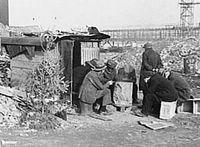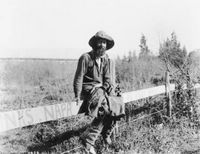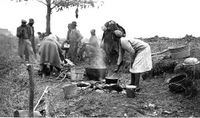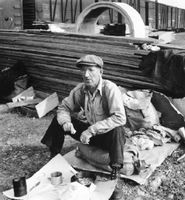Hobo Dictionary, and the dosshouse
 Via Nick Douglas and BoingBoing, I found the A Dictionary of Old Hobo Slang by Stephen P. Alpert. I love that Mr. Alpert was willing to make his research available to everybody. This is the wonder of the internet. Here are some of the very evocative entries:
Via Nick Douglas and BoingBoing, I found the A Dictionary of Old Hobo Slang by Stephen P. Alpert. I love that Mr. Alpert was willing to make his research available to everybody. This is the wonder of the internet. Here are some of the very evocative entries:alligator bait - fried or stewed liver
angel - a person who gives more than you expect
angel food - a mission sermon
bad road - a railroad or division where trainmen are especially hard on hoboes
ball lump - sandwiches or cake wrapped up and handed to a tramp
barnacle - a fellow who sticks to one job a year or more
batting - to wander aimlessly
belly robber - a boarding boss who tries to save money on food
Big Burg - New York City
Big Rock Candy Mountain - the hobo's paradise
bindle - a bundle, bag, bedroll, or backpack carried by a hobo
bindle stiff - a) a hobo who carries his gear in a sack or bundle b) a hobo who carries his bedding
blisters - beggars who put chemicals on their limbs to simulate ugly sores
bone orchard - a graveyard
bull artist - a hobo with a gift of gab
Canned Meat & Stale Punk - Chicago, Milwaukee & St. Paul RR
carry the banner - to walk the streets all night, not having a place to sleep
dead soldier - an empty whiskey bottle lying beside the road (Down Among the Dead Men)
decorate the mahogany - to buy the drinks
ding bat - a dreg of vagrantdom; mooches off other hoboes
dingoes - hoboes who refuse to work even though they claim to be looking for a job
eat snowballs - to stay north on the road in the winter
exhibition meal - a meal eaten at the doorstep (so neighbors can witness madam's generosity)
flying light - a) hungry b) traveling without a bindle
galway - a priest
ghosts - beggars who simulate pallor, haggardness, or disease
ghost story - plausible tale told to the housewife
gooseberry ranch - a brothel
graveyard stew - hot milk and toast (for those of few or no teeth)
grease the track - suicide by leaping in front of a train (there are several more terms for commiting suicide this way)
hand the match - giving an intruder a match to make his own fire, indicating he is not welcome
hoop chisler - a peddler of worthless rings and watches
how strong are you? - how much money do you have?
ice palace - a high class saloon or brothel (with many mirrors)
jack-roller - one who robs a drunken person
jungle buzzard - a dreg of vagrantdom; one who begs around hobo jungles
Land of Milk and Honey - State of Utah (why?)
make a hole in the water - suicide by drowning
mission squawker - an evangelist
noch - a Hebrew shelter for homeless men
O.P.C - other people's cigarettes, recycled
peanut farm - workhouse where the inmates crack stones (see below)
Peoria (or Peory water) - a thin soup, usually potato water with salt
read your shirt - examine your clothes for lice
remittance man - a hobo paid by his family to stay away from home
screw your nut - get wise to yourself
seam squirrels - body lice
spear biscuits - to retrieve food from garbage cans
straight crip - one actually crippled or otherwise afflicted
tourist - general term for all hoboes, tramps, bums and vagrants
trombenick - a Jewish hobo
yegg - a roving criminal
 This reminded me of a song sung by Gary and Very Aspey of Lancashire, "Tuppence on the Rope." As they told it, the Lancashire hobo could sleep in "spikes," or work-houses, but he had to do a whole day's work to earn it. And he couldn't spend two nights in the same spike, but sometimes after a whole day of breaking stones there wasn't time to get to the next spike. So then he would have to pay to sleep in a dosshouse (a flophouse - extremely cheap hotel for homeless people).
This reminded me of a song sung by Gary and Very Aspey of Lancashire, "Tuppence on the Rope." As they told it, the Lancashire hobo could sleep in "spikes," or work-houses, but he had to do a whole day's work to earn it. And he couldn't spend two nights in the same spike, but sometimes after a whole day of breaking stones there wasn't time to get to the next spike. So then he would have to pay to sleep in a dosshouse (a flophouse - extremely cheap hotel for homeless people).If he didn't have the money for a bed, for tuppence he slept standing among rows of other guys, supporting their weight with their arms draped over a rope.
I have our recording of this song somewhere and if you're interested I'll post it.
A hobo's life is brave and free I've ofttimes heard folks say
But I know better now I've trudged all through a winter's day
I've slept in barns and garden sheds and in some haystacks too
Tramped the road from coast to coast in ragged clothes and shoesBut when you're down and nearly out and have no place to go
You can shelter from the long hard night
For tuppence on the rope.
Tuppence on the rope, me boys, tuppence on the rope
I've been in spikes the country round,
Met workhouse masters many
Most of them are harsh and stern and kind ones hardly any
In dosshouse I've had many a kip, a sixpence for a bed
But in these days of poverty a tanner's hard to beg.
In Glossop Spike there's bread and scrape,
But oh, their work is hard
It's five hours spent just breaking stones
Out in the workshouse yard
In Rochdale I was given a shirt, in Bakeup got new boots
But Blackburn's beds are hardwood boards and full of hungry coots
Oh evil day when a man cannot get to his spike in time
And in a dosshouse spends his pence to hang upon the line
When workhouse masters disappear, it's not too much to hope
That we will never see again those men hung on the rope
 Lastly, some reminiscences from Rex Needle:
Lastly, some reminiscences from Rex Needle:When I was a boy in the 1930s, a tramp often called at our house asking for food. Not all visitors to our street were welcome. The road which ran along the top of our cul-de-sac was the main route from the Great North Road into town and was regularly used by tramps heading for the Spike, a dosshouse run by the Board of Guardians to provide a night's bed and board for these gentlemen of the road before they were shown the door next morning and told to move on to the next parish.
The houses in our street were among the first they would see after leaving the Great North Road and some would call in asking for hot water to make tea but their wild and unkempt appearance frightened many housewives who either refused to answer their doors or turned them away. My mother was more charitable and after helping one tramp we called Jimmy, he arrived regularly every December although he never came into the house and would wait respectfully outside the back door until his billycan was filled with boiling water and mother had cut him thick slices of bread and margarine or dripping which she carefully wrapped in an old newspaper.
Jimmy was dirty and scruffy and he carried his few possessions in a battered oilskin bag that was slung over his shoulder and supported by a leather strap. His shoes were bound up with string and cloth, his trousers torn and his overcoat secured round the waist with a cord and the old trilby hat on his head had a chicken feather stuck in the band, a souvenir perhaps of his previous night's lodgings. The skin on his face was as brown and gnarled as a walnut shell and much of it was covered by a straggly brown beard above which glinted a pair of steel blue eyes that had a haunted look and he would avert his gaze, look down and shuffle uncomfortably when anyone spoke to him. He never said a word but indicated his wants with signs and grunts and when my mother gave him food and water he would bow and nod his head and jabber incoherently but the combination of these sounds and movements were an obvious indication of his gratitude.
We never knew who he was or where he came from but my mother speculated that he was either an army veteran who had taken to the road because he could no longer face society after the horrors of trench warfare on the Somme or at Ypres during the First World War or that he had become disillusioned with life after losing his job during the depression years of the previous decade when there had been hunger marches, a rising crime rate, rioting in the streets and clashes with the police as the unemployment total passed the two million mark, the effects of which were still being felt in business and industry. Either theory was a plausible explanation for many beggars and itinerants could be seen on the roads between the wars, wandering aimlessly from town to town and then turning back and re-tracing their steps, their only purpose in life to keep moving.
Our wayfarer continued to call every year at the onset of winter until the outbreak of war in 1939. He came that year on Christmas Eve and my mother fed and watered him as had become her habit, even though we had little enough for ourselves, and she even gave him an apple because it was Christmas and his eyes filled with tears as he took it, cradling it in his hands as though it were a golden orb before rubbing the skin against his coat to give it a sheen and then stowing it away in one of his capacious pockets as a future delight. We never saw him again and although I hoped that he had found a permanent home, somewhere to live out his old age with a little comfort, I feared that he had died cold and alone, under a hedge or in a roadside ditch, during the arctic conditions that enveloped Britain during the January of 1940 when temperatures dropped so low that the River Thames froze over for the first time since 1888.
My mother did not believe in God and hardly went into a church after her wedding yet she put great store in goodness and thought charity more important than worship and Jimmy was one of her small but regular acts of kindness and one that I remember every Christmas. The world has since moved on and were Jimmy to be found roaming the highways of Britain today, he would be shuttled into a home where his immediate material wants would be provided for by the state but would he receive the kindness that he found on his annual call to our humble working class home each year?
Technorati Tags: Poverty, History, Words, Music
Labels: music



 A few of my daughter
Melina's great posts:
A few of my daughter
Melina's great posts:








2 Comments:
You do indeed, have eclectic taste.
Wonderful post. Thanks a lot for the link to the hobo slang; my Dad was a hobo after the crash in 1929 and went all over the country looking for work. He told a few stories about it, but unfortunately, at the time I was not interested and by the time I realized we should get them on tape, it was too late.
Post a Comment
<< Home